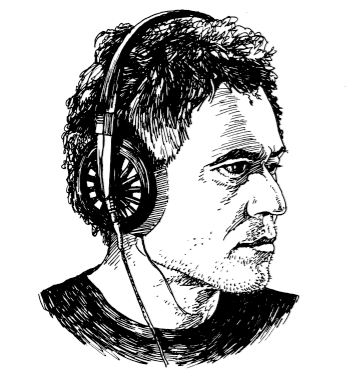When you meet people you’ve heard only on the radio, you’re often disappointed. They don’t look the way you think they should, and, as irrational as it is, you fault them for it. Often when I meet people who’ve heard me only on the radio, my first impulse is to start apologizing. But seeing Joe Frank in person for the first time was different. It was about a year ago, at the Metropolitan Pavilion in Manhattan. Now in his seventies, he was shaky as he walked up the mild ramp to the stage, while the room, filled with old friends, lovers, colleagues, and young radio nerds, was putting off a reverent, almost churchy vibe. Depending on how he moved under the stage lights, I sometimes saw him as a young man, other times as an old man. Throughout, his voice was strong.
It was while working at This American Life that I was introduced to Joe Frank. Ira Glass, who got his first job in public radio working for Frank, gave me some of the CDs from Frank’s shows, which aired for sixteen years on KCRW, out of Santa Monica. One of the CDs was a rambling, spellbinding monologue about, among other things, boxing, bullfighting, and an anonymous sexual encounter in a movie theater. But what especially stands out in my mind all these years later is how, at a certain point, he interrupted himself to go get a cup of tea. It felt funny and alive, casual and confident. I didn’t know you could do such things on the radio.
Joe’s work in many ways ran counter to the philosophy at TAL, which held radio as a didactic medium, one in which you took people by the hand and led them along, telling them what they were going to hear and what to make of what they had just heard. With Joe’s stuff, the listener felt dropped into another world and left to figure it out. Whereas at TAL we scored pieces in order to create a sense of narrative, Joe’s music was often a repeating loop—deceptively simple, highly manipulated—that would sometimes persist the entire hour. In combination with his voice, the effect could be mesmerizing and hypnotic, like a spell being cast. At TAL, radio was treated with an almost religious devotion. It was a time when eating leftover Indian takeout at your desk at 10 p.m. and scoring a story until midnight was seen as normal and natural. It wasn’t just that people, possibly over a million people, would be listening to each pause and music cue, but that these things were important in and of themselves. You were...
You have reached your article limit
Sign up for a digital subscription and continue reading all new issues, plus our entire archives, for just $1.50/month.
Already a subscriber? Sign in





